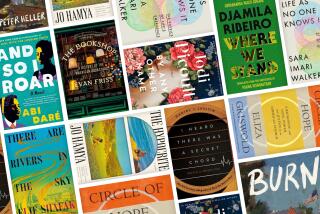I am convinced that there are certain...
I am convinced that there are certain kinds of suffering that are relieved only by poetry, whether the reading or the writing of it, or both. As Robert Graves once wrote, “A well-chosen anthology of verse is a complete dispensary for the more common mental disorders and may be used as much for prevention as for cure.” An articulate and enthusiastic minority of psychiatrists and psychotherapists endorses the curative powers of poetry in Poetry as Healer: Mending the Troubled Mind, an Anthology of Essays and Studies, edited by Dr. Jack J. Leedy (Vanguard: $14.95; also available in hardcover, $17.95). “Like medications, poems are now used as tranquilizers, antidepressants, sedatives, and hypnotics,” explains Leedy. “No one has ever died of an overdosage of poetry.”
“Poetry as Healer” is really the manifesto of a small movement that styles itself as the National Assn. for Poetry Therapy, and urges the use of poetry as a diagnostic and therapeutic technique in the treatment of neurosis and psychosis, teaching the blind and disabled, prison counseling, drug rehabilitation and other forms of psychotherapy. Thus, for example, Dr. Anthony Pietropinto expounds on the use of “Jabberwocky” as a kind of literary Rorschach test: “Nonsense poetry,” he writes in “Exploring the Unconscious Through Nonsense Poetry,” “may be the poetic highway most parallel to the ‘royal road’ of dreams.” And a group of practitioners working with schizophrenics at a Pittsburgh state hospital report that “poetry can put a wedge into the pathology and defenses of a psychotic.”
“Poetry as Healer” is written for two audiences. The so-called healing professions will find a scholarly discussion of the theory and practice of “poetry therapy.” But, as a lay reader, I was far more interested in “Poetry as Healer” as an anthology of poetry, and an exercise in consciousness-raising for readers and makers of poetry. Consider the efforts of a 15-year-old drug addict in the Bronx who utterly refused to discuss the devastating impact of her father’s death--but managed to produce a poem that may have saved her life: “Betty Lipshitz’s/middle aged son is DAD? I saw him in Hellman’s funeral parlor/ a skinny, ghostlike, colorless head/ on interior of white silk that lines/ his bed of walnut wood, that shines/ in his Sleeping Beauty World/ I KISS!/ but DADDY you are still/ FOREVER.” If, as Auden noted, the aim of writing “is to enable people a little better to enjoy life or a little better to endure it,” then the therapists and patients whose work is collected and described in “Poetry as Healer” are worthy of the lofty title of poet.
Sixteen years ago, when pop-psychology was still a novel concept in publishing, Dr. Thomas A. Harris popularized “Transactional Analysis” and the theories of Dr. Eric Berne in the best-selling “I’m OK--You’re OK.” Now Harris and his wife are back with Staying OK (Avon: $3.95), a sequel introduced by Harris but largely written by his wife and collaborator, Amy Bjork Harris. The sturdy post-Freudian theoretical underpinnings are the same--id, ego and superego have been recast as Child, Adult and Parent--and so is the practical emphasis on problem-solving in the real world. And the tone is still earnest but slightly simplistic: “The ultimate goal of TA is to enable a person to have freedom of choice,” explains Amy Harris. “The goal of this book is to use the tools of TA to handle bad feelings and to produce good ones.” But the Harrises have not been asleep during the last 1 1/2 decades--the emphasis is now on parenting and time management as well as relationships and self-fulfillment--and “Staying OK” is an interesting elaboration on the techniques that have spawned a thousand self-help books.
New and Noteworthy: And then there is a kind of suffering that is soothed only by a walk on the beach or a hike in the woods--Dennis Gagnon decribes more than 100 such walks and hikes in Hike Los Angeles, Vol. 1 and Vol. 2 (Western Tanager Press, 1111 Pacific Ave., Santa Cruz 95060: $8.95 per volume), a savvy and often surprising two-volume guide to trekking in and around the streets, beaches, foothills and mountains of Southern California.
More to Read
Sign up for our Book Club newsletter
Get the latest news, events and more from the Los Angeles Times Book Club, and help us get L.A. reading and talking.
You may occasionally receive promotional content from the Los Angeles Times.









